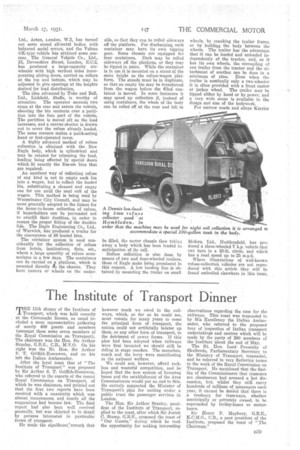The Institute of Transport Dinner
Page 91

If you've noticed an error in this article please click here to report it so we can fix it.
MHE 11th dinner of the Institute of Transport, which was held recently at the Connaught Rooms, as usual included a most representative gathering of nearly 400 guests and members (amongst them some seven members of the Royal Commission on Transport). The chairman was the Hon. Sir Arthur Stanley, G.B.E., C.B., M.V.O. On his right was the Rt. Hon. Sir Arthur S. T. Griffith-Boscawen, and on his left the Italian Ambassador.
After the loyal toast that of " The Institute of Transport" was proposed by Sir Arthur S. T. Griffith-Boscawen, , who referred to the reports of the recent Royal Commission on Transport, of which he was chairman, and pointed out that the first two reports have been received with a unanimity which was almost monotonous, and nearly all the suggestions had become law. The final report had also been well received generally, but was objected to in detail by persons interested in particular forms of transport.
He made the significant remark that
however much we owed to the railways, which, so far as he could see, must remain for many years to come the principal form of transport, the nation could not artificially bolster up them, or any other form of transport, to the detriment of newer forms. If this plan had been adopted when railways were first invented we should still be riding in stage coaches. The motorbus, coach and the lorry were contributing to the national welfare.
We could not, however, afford reckless and wasteful competition, and he hoped that the new system of licensing buses and the establishment of the Area Commissioners would put an end to this. Ile entirely supported the Minister of Transport's plan for uniting under a public trust the passenger services in London.
The Hon. Sir Arthur Stanley, president of the Institute of Transport, replied to the toast, after which Sir Josiah C. Stamp, G.B.E., proposed the toast of "Our Guests," during which he took the opportunity for making interesting observations regarding the case for the railways. This toast was responded to by His Excellency the Italian Ambassador, who referred to the proposed tour of inspection of Italian transport undertakings and centres which will be made by the party of 200 members of the Institute about the end of May.
The Rt. Hon. Lord Ponsonley of Shulbrede, Parliamentary Secretary to the Ministry of Transport, responded, and he referred in very flattering terms to the work of the Royal Commission on Transport. He mentioned that the' finding of the Commissioners that tramcars are obsolescent had aroused a hot discussion, but, whilst they -still carry hundreds of millions of passengers each year, it cannot be denied that there is a tendency for tramways, whether municipally or privately owned, to be superseded by trolley-buses or motor buses.
Sir Henry P. Maybury, G.B.E., X.C.M.G., C.B., a past president of the Institute, proposed the toast of "The Chairman."
























































































































































































